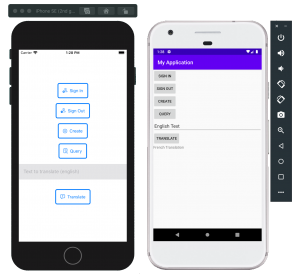News
AWS Boosts Mobile App Development with Amplify Libraries
- By David Ramel
- June 3, 2020
Cloud giant Amazon Web Services (AWS) has extended its Amplify family of cloud tools/services for developing mobile apps with new iOS- and Android-specific libraries.
The
AWS Amplify service, which was
introduced a few years ago, functions as a cloud-based back-end to bolster mobile development with three main components:
- Amplify Libraries: Open source libraries and UI components for adding cloud-powered functionality
- Amplify CLI: An open source interactive toolchain to create and manage a back-end for apps
- Amplify Console: An AWS service to deploy and host full-stack serverless web applications
"Amplify iOS and Amplify Android include libraries and tools (CLI toolchain and IDE helpers) that enable mobile developers to build scalable and secure cloud-powered applications," AWS said in a May 27 blog post. "You can use the libraries with backends created using the Amplify CLI or with existing AWS backends. It is our recommended way to build native mobile applications powered by AWS services."
 AWS Amplify Demo (source: AWS).
AWS Amplify Demo (source: AWS).
The new iOS and Android offerings specifically provide:
- Amplify CLI: Configure all the services needed to power your backend through a simple command-line interface
- Amplify iOS Libraries and Android Libraries: Use case-centric client libraries to integrate app code with a backend using declarative interfaces
- Amplify UI Components: - UI libraries for React, React Native, Angular, Ionic and Vue
"Until today, when you developed a cloud-powered mobile application, you were using a combination of tools and SDKs: the Amplify CLI to create and manage your backend, and one or several AWS Mobile SDKs to access the backend," said AWS' Sébastien Stormacq in his own post. "In general, AWS Mobile SDKs are low-level wrappers around the AWS Services APIs. They require you to understand the API details and, most of the time, to write many lines of undifferentiated code, such as object (de)serialization, error handling, etc."
That process is simplified, Stormacq said, through:
- Native libraries oriented around use-cases, such as Authentication, Data storage and access, machine learning predictions etc.
- A declarative interface that enables developers to programmatically apply best practices with abstractions
"Thinking in terms of use cases instead of AWS Services results in higher-level abstraction, faster development cycles, and fewer lines of code," Stormacq said. "Secondly, they provide tools that integrate with your native IDE toolchain: XCode for iOS and Gradle for Android."
The new service is free of charge to developers, who need only pay for the back-end services used by an application, above the free tier level. The respective iOS and Android offerings can be obtained from the the CocoaPods and Maven Central code repositories.
The project's source code is available on GitHub.
About the Author
David Ramel is an editor and writer at Converge 360.